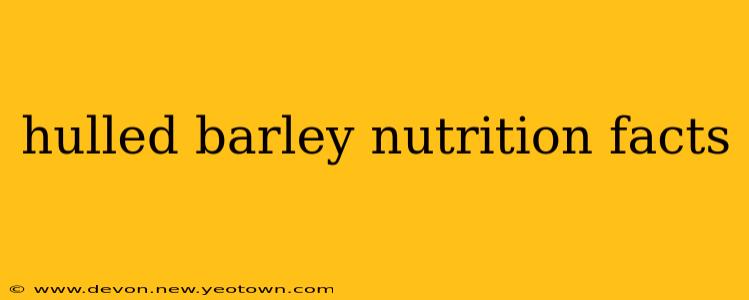Barley, a humble grain often overshadowed by its more popular cousins like wheat and rice, deserves a spot in the limelight. Specifically, hulled barley, which retains its nutritious bran layer, boasts a remarkable nutritional profile that benefits your overall health. Let's delve into this nutritional powerhouse and explore why adding hulled barley to your diet is a smart move.
My journey into the world of hulled barley began with a simple question: “Is it really that healthy?” What I discovered was far more compelling than I initially anticipated. This wasn't just another grain; it was a nutritional goldmine, packed with fiber, antioxidants, and essential vitamins and minerals.
What are the Nutritional Benefits of Hulled Barley?
Hulled barley stands out due to its impressive nutritional density. A single cup of cooked hulled barley provides a significant dose of:
-
Fiber: This is where hulled barley truly shines. It's a fantastic source of both soluble and insoluble fiber, crucial for digestive health. Soluble fiber helps regulate blood sugar levels and cholesterol, while insoluble fiber promotes regularity and prevents constipation.
-
Protein: While not as high in protein as some other grains, hulled barley provides a decent amount, contributing to satiety and muscle building.
-
Vitamins and Minerals: It's a good source of several essential vitamins and minerals, including manganese, selenium, and B vitamins, all vital for various bodily functions.
-
Antioxidants: These powerful compounds protect your cells from damage caused by free radicals, reducing the risk of chronic diseases.
The nutritional profile of hulled barley makes it a valuable addition to a balanced diet, particularly for individuals looking to improve their digestive health, manage their weight, and reduce their risk of chronic diseases.
What is the Difference Between Hulled Barley and Pearled Barley?
This is a question many people ask, and it's crucial to understand the difference. Hulled barley retains the bran layer and germ, which is where most of the nutrients reside. Pearled barley, on the other hand, has had the bran layer removed, resulting in a smoother texture but a significant loss of nutritional value. Think of it like the difference between whole wheat bread and white bread—whole wheat offers significantly more nutrients. For maximum health benefits, always opt for hulled barley.
Is Hulled Barley Gluten-Free?
No, hulled barley is not gluten-free. It contains gluten, a protein that can trigger an immune response in individuals with celiac disease or gluten sensitivity. If you have these conditions, you should avoid hulled barley and choose gluten-free alternatives.
How Can I Incorporate Hulled Barley into My Diet?
Hulled barley is incredibly versatile and can be easily incorporated into various dishes. You can use it as a:
- Side dish: Cook it like rice and pair it with roasted vegetables or grilled chicken.
- Soup ingredient: Add it to hearty soups and stews for added texture and nutrition.
- Salad component: Use cooked barley as a base for salads, adding protein and fiber.
- Ingredient in baking: It can be used in breads and muffins for a healthier twist.
What are the potential health benefits of eating hulled barley?
The health benefits are numerous. Studies suggest that regular consumption of hulled barley may contribute to:
- Improved digestive health: Due to its high fiber content.
- Better blood sugar control: The soluble fiber helps regulate blood sugar levels.
- Reduced cholesterol levels: Soluble fiber also contributes to lower cholesterol.
- Weight management: The high fiber content promotes satiety, helping you feel fuller for longer.
- Reduced risk of chronic diseases: The antioxidants and various nutrients offer protection against chronic diseases.
Is hulled barley good for weight loss?
The high fiber content in hulled barley contributes to satiety, meaning you feel fuller for longer. This can help with weight management by reducing overall calorie intake. However, it's important to remember that weight loss is a complex process involving diet, exercise, and overall lifestyle choices. Hulled barley can be a valuable part of a weight-loss strategy, but it's not a magic bullet.
This comprehensive exploration of hulled barley reveals its potential as a significant contributor to a healthy lifestyle. From boosting digestive health to aiding weight management and reducing the risk of chronic diseases, its remarkable nutritional profile makes it a grain worth adding to your diet. Remember to always consult with a healthcare professional or registered dietitian before making significant dietary changes.

